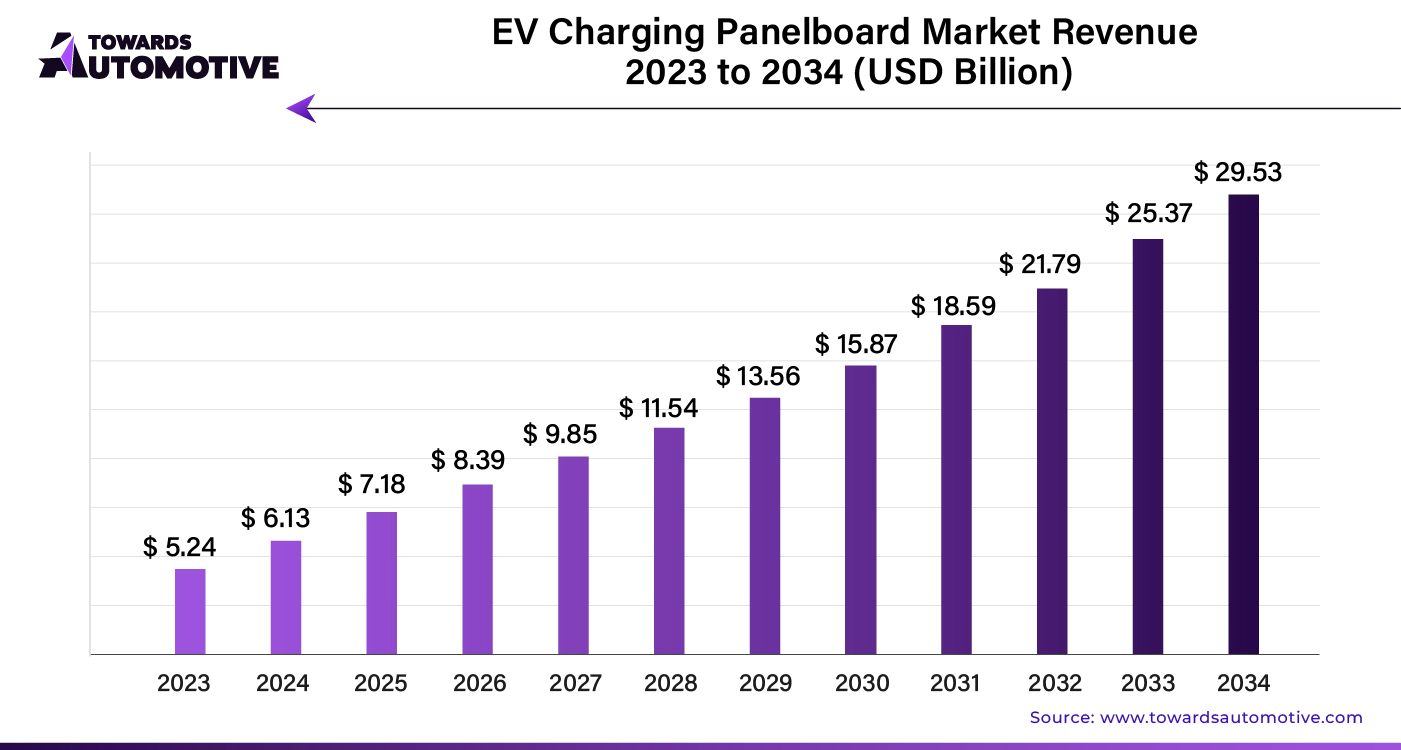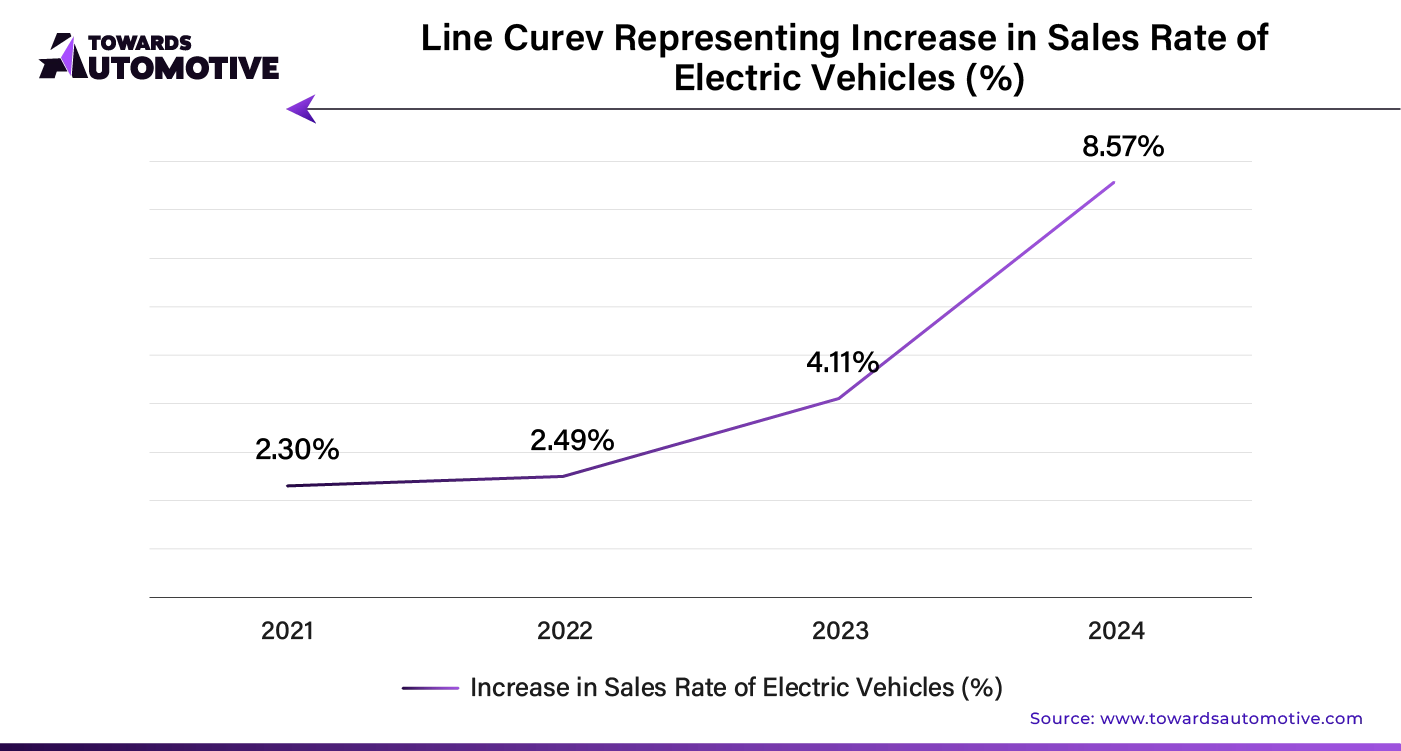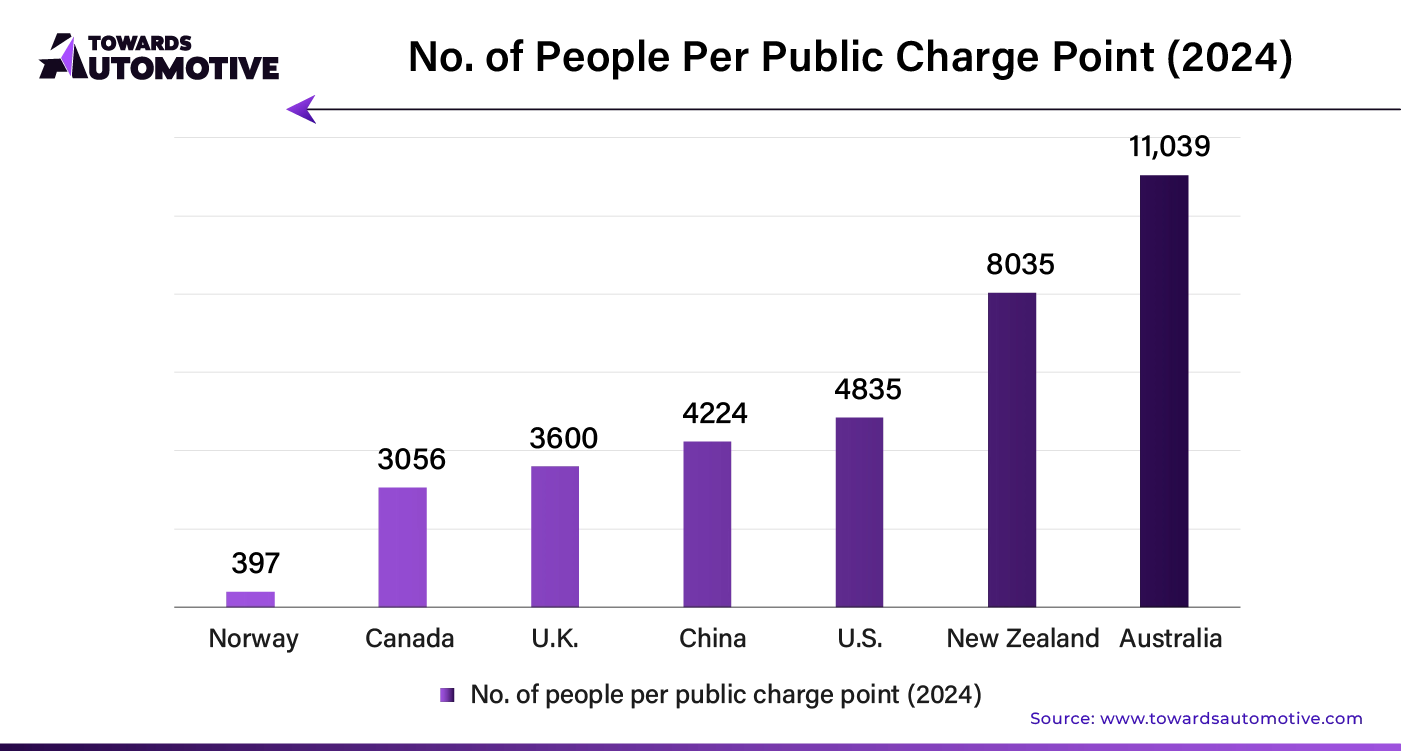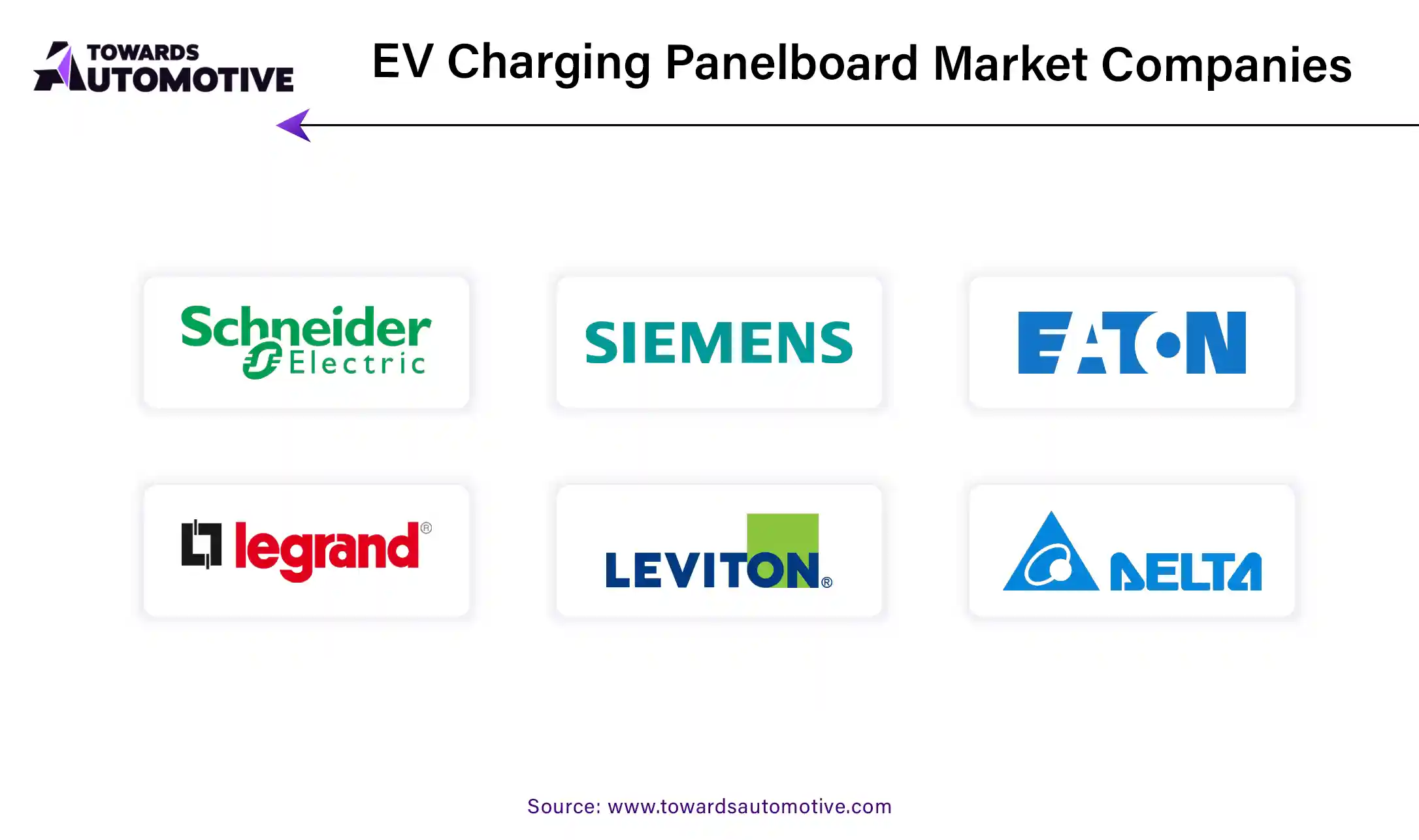March 2025
The EV charging panelboard market is forecasted to expand from USD 7.18 billion in 2025 to USD 29.53 billion by 2034, growing at a CAGR of 17.13% from 2025 to 2034.

Unlock Infinite Advantages: Subscribe to Annual Membership
The global electric vehicle (EV) market is growing rapidly, increasing the demand for EV charging panelboards. This growth reflects a shift toward sustainable transportation, as more people choose electric vehicles to reduce carbon emissions and support eco-friendly mobility.
As EVs become more mainstream, the need for reliable and efficient charging stations rises, highlighting the importance of advanced panelboard solutions. Supportive government policies, such as subsidies and tax breaks, are further accelerating EV adoption and expanding charging infrastructure.
Government incentives are driving both consumer and corporate interest in electric mobility, contributing to the development of necessary charging infrastructure. These initiatives align with broader environmental goals to reduce greenhouse gas emissions. The automotive market valued at USD 4,070.19 billion in 2023, is experiencing growth and is projected to surpass USD 6,678.28 billion by 2032, with a significant CAGR of over 5.66%.
The continuous evolution of EV charging technology, including fast charging and improved safety features, is increasing the need for advanced panelboards that can accommodate these innovations. The high demand for efficient, convenient, and safe charging solutions underscores the essential role of sophisticated panelboards in the growing EV market.

AI is revolutionizing the EV charging panelboard market by enhancing efficiency and user experience. Through advanced algorithms, AI optimizes the charging process, improving energy distribution and reducing wait times. Intelligent systems predict peak usage times and adjust power allocation accordingly, minimizing grid strain and lowering energy costs.
AI-driven predictive maintenance ensures panelboards remain operational, reducing downtime and preventing costly repairs. By analyzing data from multiple sources, AI identifies potential issues before they become critical, ensuring uninterrupted service and enhancing reliability.
Additionally, AI enhances user interaction with smart features such as personalized charging schedules and real-time status updates. This not only improves convenience for EV owners but also increases overall system efficiency.
As AI continues to evolve, it will further integrate with emerging technologies, driving innovation in the EV charging panelboard sector. This integration will accelerate market growth by offering more efficient, reliable, and user-friendly solutions. In essence, AI is set to transform the EV charging landscape, propelling the market to new heights.
In the rapidly growing EV charging panelboard market, the supply chain plays a crucial role in ensuring timely and efficient delivery of products. The supply chain begins with the sourcing of raw materials, including metals, plastics, and electronic components. Suppliers deliver these materials to manufacturers, who assemble the panelboards according to industry standards and specifications.
Manufacturers then conduct rigorous testing to ensure quality and reliability before shipping the finished products to distributors. Distributors manage inventory and handle logistics, ensuring that panelboards reach various retail and installation points.
To meet increasing demand and technological advancements, companies invest in robust supply chain management systems. These systems enable real-time tracking, forecast demand, and optimize inventory levels. Close collaboration between suppliers, manufacturers, and distributors minimizes delays and reduces costs.
Effective supply chain management also involves addressing potential disruptions, such as material shortages or transportation issues. By implementing strategic partnerships and diversifying sources, companies can maintain a steady flow of products. Ultimately, a well-coordinated supply chain enhances customer satisfaction and supports the growth of the EV charging panelboard market.
East Asia's Market Dominance
East Asia is set to maintain its leading position in the EV charging panelboard market, holding approximately 50% of the global share in 2024. Key factors contributing to this dominance include:
The six-way outgoing configuration is expected to dominate the EV charging panelboard market with a 22% volume share in 2024. This growth is driven by:
The rapid growth of the electric vehicle (EV) market is driving an increased demand for EV charging panelboards. As more consumers choose electric vehicles to cut carbon emissions and embrace eco-friendly options, the need for efficient and reliable charging infrastructure becomes critical. This trend is reshaping the automotive industry and creating significant demand for advanced panelboard solutions.
Government policies and incentives are further boosting the EV market. Supportive measures such as subsidies, tax breaks, and regulations are encouraging the adoption of electric vehicles and the development of charging infrastructure. These initiatives aim to reduce greenhouse gas emissions and reliance on fossil fuels, promoting a transition toward sustainable transportation.
Technological advancements in EV charging, including faster charging rates, enhanced safety features, and smart charging capabilities, are driving the need for sophisticated panelboards. As EV technology evolves, panelboards must adapt to meet the requirements of modern charging systems.
Increased investment in charging infrastructure by both government and private sectors is fueling growth in the EV charging panelboard market. Investments in urban and highway charging networks enhance accessibility and reliability, positioning panelboards as crucial components in the expanding EV ecosystem.
Overall, the growing electric vehicle market and advancements in charging technology are set to propel the demand for innovative EV charging panelboards.
The EV Charging Panelboard market is fueled by several key components and contributions from prominent companies. At its core, the market comprises electric vehicle (EV) charging panelboards, which manage and distribute power to EV chargers. These panelboards include vital elements such as circuit breakers, load centers, and metering systems that ensure efficient power management and safety.
Major players in the market, such as Schneider Electric, Siemens, and ABB, contribute significantly by offering advanced panelboard solutions. Schneider Electric provides innovative panelboards with integrated energy management and smart grid technology. Siemens focuses on high-efficiency panelboards that enhance safety and reliability for commercial and residential EV charging stations. ABB delivers robust panelboards that support fast-charging infrastructure and scalable solutions.
Additionally, companies like Eaton and Legrand offer customized panelboards designed to meet specific regulatory and performance standards. Eaton’s solutions emphasize energy efficiency and integration with renewable energy sources, while Legrand’s offerings prioritize user-friendly interfaces and modular designs.
Together, these companies drive innovation and reliability in the EV Charging Panelboard market, supporting the growth of EV infrastructure and accelerating the transition to sustainable transportation.
High Initial Investment Costs
The EV charging panelboard market struggles with high initial investment costs for setting up charging infrastructure. The substantial expenses for installing panelboards and related components can deter market entry, particularly for small companies or regions with limited budgets. These upfront costs can slow the expansion of EV charging networks and limit accessibility, especially in financially constrained areas. Addressing these cost barriers with innovative strategies is crucial for fostering widespread adoption of EV charging panelboards.
Charging Infrastructure Standardization Challenges
Consumer concerns about range anxiety—fear of running out of battery and long charging times—pose significant hurdles to EV adoption. These apprehensions can deter people from switching to electric vehicles, which in turn affects the demand for EV charging panelboards. To overcome these barriers, advancements in battery technology, expansion of charging infrastructure, and faster charging solutions are essential. Improving charging infrastructure's accessibility and efficiency will help boost consumer confidence, reduce range anxiety, and accelerate the shift toward electric mobility.
France
The EV charging panelboard market in France is expected to grow at a notable CAGR of 18.6% from 2024 to 2034. This growth is supported by robust governmental incentives and initiatives aimed at promoting the adoption of electric vehicles.
United Kingdom
In the UK, the market is projected to expand at a CAGR of 17.3% over the same period. This growth is significantly influenced by a substantial government investment of $85 million in fast-charging infrastructure, which is enhancing the EV charging network and supporting broader EV adoption.
Germany
Germany's EV charging panelboard market is anticipated to grow at a strong CAGR of 17.1%. The country’s dedication to reducing greenhouse gas emissions and its ambitious goals for EV adoption are major drivers of this growth. Additionally, Germany’s automotive industry and supportive government measures are contributing to the increased demand for charging solutions.
China
In China, the market is projected to experience a CAGR of 15.6%. The country’s emphasis on environmental conservation and stringent regulations are encouraging the use of electric vehicles. Government subsidies and investments in EV infrastructure are fueling the demand for EV charging panelboards.
United States
The US is expected to hold approximately 14% of the global EV charging panelboard market share in 2024, with a projected CAGR of 14.5%. The rising adoption of electric vehicles and supportive policies at both federal and state levels are driving the increased demand for charging infrastructure.
The residential charging segment is expected to lead with a strong CAGR of 16.2% from 2024 to 2034. This growth is attributed to the convenience of home charging stations, which allow electric vehicle (EV) owners to recharge overnight and minimize visits to public stations. Home installations also offer cost advantages through off-peak electricity rates and renewable energy sources like solar power. Additionally, residential charging provides enhanced privacy and security, motivating more consumers to switch to EVs by addressing range anxiety.
The individual consumers segment is projected to dominate with a CAGR of 15.8% over the same period. The increasing adoption of EVs among individuals drives the demand for home charging infrastructure, including panelboards. As more people choose EVs for their daily commutes, the need for reliable and convenient home charging solutions grows. This trend is supported by government incentives and environmental programs aimed at promoting sustainable transportation and reducing carbon emissions.

ABB Group, Schneider Electric, Siemens AG, Eaton Corporation, Legrand, Leviton Manufacturing Co., Inc., Delta Electronics, General Electric (GE), Mitsubishi Electric Corporation, and Panasonic Corporation dominate the EV charging panelboard market. These top manufacturers and suppliers are actively researching and developing new electrical panels for EV charging stations to meet growing consumer demands.
To enhance their market presence, these companies are pursuing various strategies, including collaborations, mergers, acquisitions, and facility expansions.
Key Market Players:

By Outgoing Ways
By Location Type
By End-use
By Region
March 2025
March 2025
March 2025
March 2025
Dr. Arjun Patel is a distinguished expert in the automotive industry, holding advanced degrees in Automotive Engineering and Mechanical Engineering. His expertise spans automotive market dynamics, technological advancements, and sustainable practices. Dr. Patel excels in conducting in depth research and analysis on market trends, consumer preferences, and the economic implications within the automotive sector. He is renowned for his insightful publications on topics such as electric vehicles, autonomous driving technologies, and the evolution of sustainable transportation solutions. Dr. Patels research contributions have significantly advanced understanding in the field, earning him recognition as a leading authority in automotive research and analysis.
We offer automotive expertise for market projections and customizable research, adaptable to diverse strategic approaches.
Contact Us